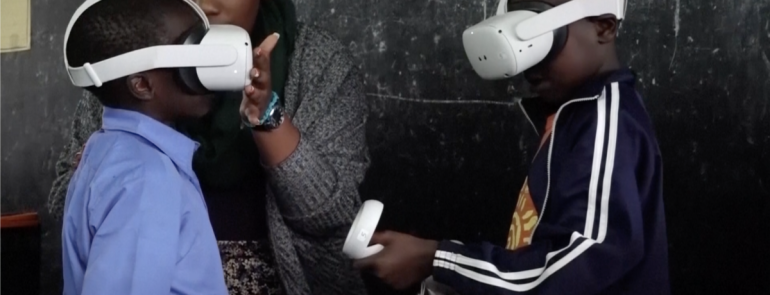Today, Virtual Reality (VR) is a conversation you cannot escape. From gaming to immersive experiences, VR has taken the world by storm, and now it’s making its way into classrooms with a bang.
In Nairobi, a school is breaking free from the constraints of traditional learning. VR is the name of the game; revolutionizing education and it is opening up a world of possibilities for young minds. These students are diving head-first into virtual realms where they can explore social and environmental issues in a whole new way.
Pupils at MCEDO (Mathare Community Education and Development Organization), Beijing School in Nairobi’s Mathare neighbourhood have been learning about the collection and segregation of waste.

Let’s face it, learning about topics like plastic pollution and climate change can be a bit boring when it is all just theory and words on a page. But with VR technology, these students are getting a front-row seat to the impacts on the environment. They can see it, feel it and experience it for themselves, which takes their understanding to a whole new level. Thanks to Kenya-based Ukwenza VR, a social enterprise that focuses on issues like plastic pollution and climate change, these students are becoming champions of the environment.
Annette Jeptoo, one of the students, excitedly shares her experience, “Ukwenza VR has helped me and other students to take care of the environment by separating plastics and organic waste.” The impact is real.
“Before, I would use plastic bottles and dispose of them by any means, but now I am not buying soda or water using a plastic bottle. I buy soda in a glass bottle,” says Rooney Odhiambo, another pupil demonstrating the transformation of his daily habits in order to make a difference.
But it doesn’t stop there. Ukwenza VR is on a mission to bridge the gap and bring virtual field trips to schools in low-income areas, where financial constraints often hinder such experiences. Their dedication to creating awareness about plastic pollution and climate change is truly inspiring.

Njeri Ndonga, co-founder and CEO of Ukwenza VR, sheds light on the challenge of getting children to care enough about these complex issues to take action. That’s where VR comes in. Ndonga explains, “Virtual reality comes in helping them, one, conceptualize the problem. It’s one thing to say ‘don’t throw away waste,’ but it is another thing to understand that if I throw away a plastic bottle, it will end up in the Indian Ocean and it will affect marine life, which then affects me because I want to eat that fish. So, you are able to create a chain that helps them connect their action to each thing that happens along the way.”
Anne Njine, an education specialist, is a firm supporter of this VR revolution. She emphasizes how VR helps children develop empathy for the issues they’re learning about. “What VR does is that it helps the children get the right emotions in place,” she says. “Because VR is more effective in project-based activities, then there is a lot of collaboration and discussions that come from there.” The sight of turtles swallowing papers under the sea or dumpsites overflowing with waste sparks a fire within these students. They engage in meaningful discussions, asking themselves, “What can we do about it? It can only get worse. So, what will we do about it?”

